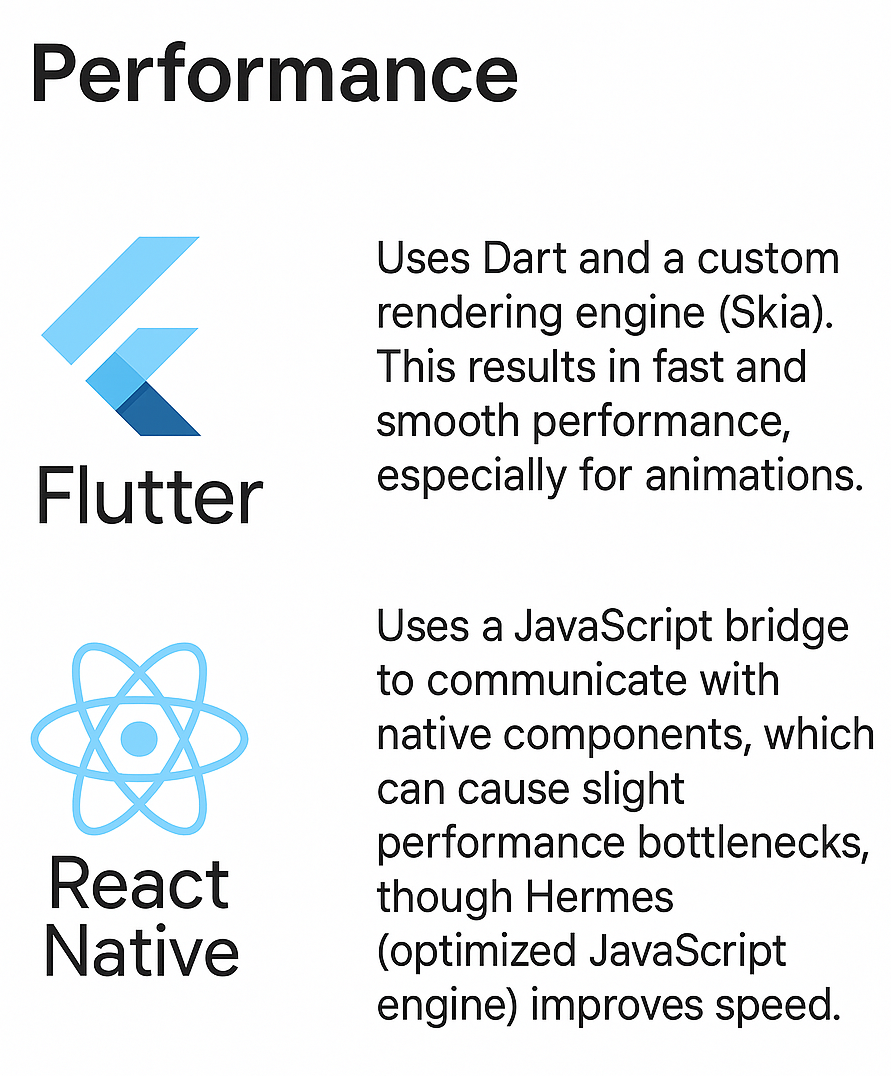Flutter vs. React Native: Which One Should You Choose in 2025?

Choosing between Flutter and React Native in 2025 depends on your project requirements, team expertise, and long-term goals. Here's a comparison based on key factors:

1. Performance
Flutter: Uses Dart and a custom rendering engine (Skia). This results in fast and smooth performance, especially for animations.
React Native: Uses a JavaScript bridge to communicate with native components, which can cause slight performance bottlenecks, though Hermes (optimized JavaScript engine) improves speed.
Winner: Flutter (better performance due to direct rendering).
2. Development Speed & Ease
Flutter: Uses a single codebase for iOS, Android, web, and desktop. However, Dart has a steeper learning curve compared to JavaScript.
React Native: Easier to pick up for JavaScript/React developers. Also, a strong community and third-party libraries make development faster.
Winner: React Native (faster adoption and ease for web developers).
3. UI & Customization
Flutter: Offers pixel-perfect UI with a rich set of widgets that look the same across platforms. Highly customizable but requires designing everything from scratch.
React Native: Uses native UI components, leading to a more native look and feel, but achieving consistency across platforms may require extra work.
Winner: Flutter (better UI consistency and customization).
4. Ecosystem & Community
Flutter: Growing rapidly, strong Google support, but fewer third-party packages compared to React Native.
React Native: Backed by Meta (Facebook), with a huge community, plugins, and extensive third-party support.
Winner: React Native (larger ecosystem and more third-party integrations).
5. Stability & Future-Proofing
Flutter: Google actively invests in it, and Flutter 3 supports iOS, Android, web, Windows, macOS, and Linux.
React Native: Continues evolving with React updates and Meta’s support. However, Flutter’s native performance makes it a strong contender for long-term stability.
Winner: Flutter (better multi-platform support and native-like stability).
6. Platform Support
| Feature | Flutter | React Native |
|---|---|---|
| iOS & Android | ✅ Yes | ✅ Yes |
| Web Support | ✅ (Stable) | ⚠️ (Limited) |
| Windows/macOS/Linux | ✅ (Stable) | ⚠️ (Limited) |
| Embedded Systems | ✅ (IoT, Smart TVs) | ❌ No |
Winner: Flutter (better multi-platform compatibility).
Final Verdict: Which One to Choose in 2025?
Choose Flutter if:
✅ You need high performance and smooth UI.
✅ You want to build for multiple platforms (mobile, web, desktop) with one codebase.
✅ You’re okay with learning Dart.
Choose React Native if:
✅ Your team is already familiar with JavaScript/React.
✅ You need strong third-party library support.
✅ You want to integrate with an existing web project.
Overall: Flutter is better for performance and UI-heavy apps, while React Native is easier to adopt and great for startups/web-focused teams.